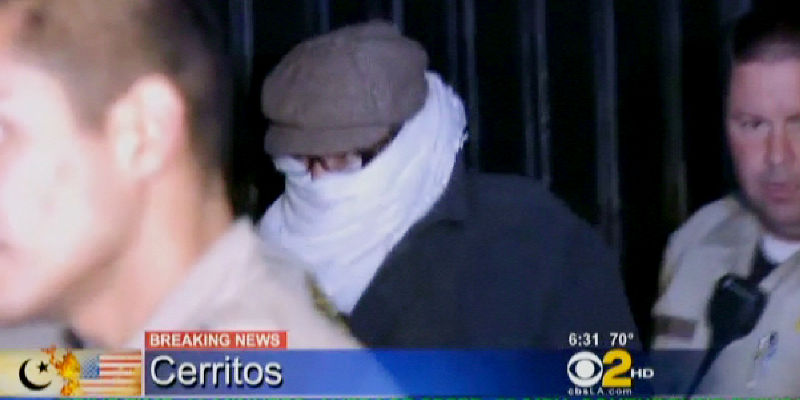
In this Sept. 15, 2012 file image from video provided by CBS2-KCAL9, Nakoula Basseley Nakoula, the man behind a crudely produced anti-Islamic video that has inflamed parts of the Middle East, is escorted by Los Angeles County sheriff’s deputies from his home in Cerritos, Calif. Nakoula, 55, was arrested Thursday for violating terms of his probation, authorities said. (AP Photo/CBS2-KCAL9, File)
LOS ANGELES— Muslims across the Middle East outraged by an anti-Islam film made in America wanted swift punishment for the man behind the movie, and now Mark Basseley Youssef is behind bars. But he’s jailed for lying about his identity, not because of the video’s content.
Court documents show Youssef, 55, legally changed his name from Nakoula Basseley Nakoula in 2002, but never told federal authorities, who now are using that as part of the probation violation case against him.
Youssef was ordered jailed without bail Thursday until a hearing is held to determine if he violated terms of his supervised release on a 2010 bank fraud conviction. Prosecutors allege he used multiple aliases and lied to his probation officers about his real name.
Youssef, an Egyptian-born Christian who’s now a U.S. citizen, sought to obtain a passport in his new name but still had a California driver’s license as Nakoula, assistant U.S. Attorney Robert Dugdale said Friday. Youssef used a third name, Sam Bacile, in association with the 14-minute trailer for the movie “Innocence of Muslims” that was posted on YouTube. It portrays Muhammad as a religious fraud, womanizer and pedophile.
Angry protests sparked by the film broke out Sept. 11 in Egypt and Libya and violence related to the film has spread, killing dozens. Enraged Muslims demanded punishment for Youssef, and a Pakistani cabinet minister has offered a $100,000 bounty to anyone who kills him.
Youssef went into hiding on Sept. 15 and his home in the Los Angeles suburb of Cerritos was put up for sale. He was arrested Thursday and appeared that afternoon for a proceeding in a courtroom that was opened only to lawyers and his family. A feed was provided to the media in a different building.
Afterward, Youssef was whisked away to a federal detention center in Los Angeles where he’ll stay until the hearing.
The case isn’t about Youssef’s constitutional right to make a controversial film. Rather, Dugdale said, it’s about his failure to live up to his obligation to be truthful with federal authorities.
“The fact that he wasn’t using his true name with probation, that’s where the problem is,” said Dugdale, who noted federal authorities now will refer to Nakoula as Youssef.
Adam Winkler, a constitutional law professor at the University of California, Los Angeles’ School of Law, said U.S. Central District Chief Magistrate Judge Suzanne Segal’s decision to order Youssef held without bail is supported by the evidence.
“He has numerous different aliases and numerous government documents with different names on them and that’s exactly the kind of person that judges want to be extra careful with,” he said. “This is not an end-run around constitutional protections. Those are major red flags in any case and even if this was a low-profile case and the same facts had come out, this person would be denied bond.”
Given the threats against him, Youssef has the motive to flee, even if there’s an arrest warrant for him in his native Egypt and a call for his head in Pakistan, said Olu Orange, a former public defender and an adjunct professor in the University of Southern California’s political science department.
“He has the means to leave, as well as the inclination and the know-how. I don’t see him as not being a flight risk,” Orange said.
Youssef’s attorney, Steven Seiden, has not replied to multiple requests for comment via letter, email and phone message. In court Thursday, he sought to have the hearing closed and his client released on $10,000 bail. He argued Youssef has checked in with his probation officer frequently and made no attempts to leave Southern California.
A hearing will be scheduled to determine if Youssef violated his probation. Prosecutors also said he could face new charges, though they provided no details other than to say they could carry a two-year prison sentence.
After his 2010 conviction, Youssef was sentenced to 21 months in prison and was barred from using computers or the Internet for five years without approval from his probation officer, though prosecutors said none of the violations involved the Internet. He also wasn’t supposed to use any name other than his true legal name without the prior written approval of his probation officer.
Orange County Superior Court documents show Nakoula was granted a name change petition in 2002 and legally became Mark Basseley Youssef. As reason for the change, he said: “Nakoula is a girl’s name and it cause me troubles.”
Authorities said Youssef used more than a dozen aliases and opened about 60 bank accounts and had more than 600 credit and debit cards to conduct the check fraud.
When he was identified as Nakoula after the movie trailer went viral, federal probation officials questioned him. He denied using the name Sam Bacile, which was listed on the YouTube account that posted the trailer, and said his role in the film was limited to writing the script. Dugdale said there is evidence showing Youssef had a larger role in the film. He declined to elaborate.
Rebecca Lonergan, a former federal prosecutor who now teaches at the University of Southern California’s Gould School of Law, said it’s possible federal authorities never would have pursued a probation violation case against Youssef were it not for the film.
“They don’t have enough people to go out and pick up every single violator on every single warrant, but he did something that brought him to everybody’s attention,” Lonergan said. “I think the reality is he brought this on himself.”
_____
Associated Press writer Amy Taxin in Orange, California, contributed to this report.